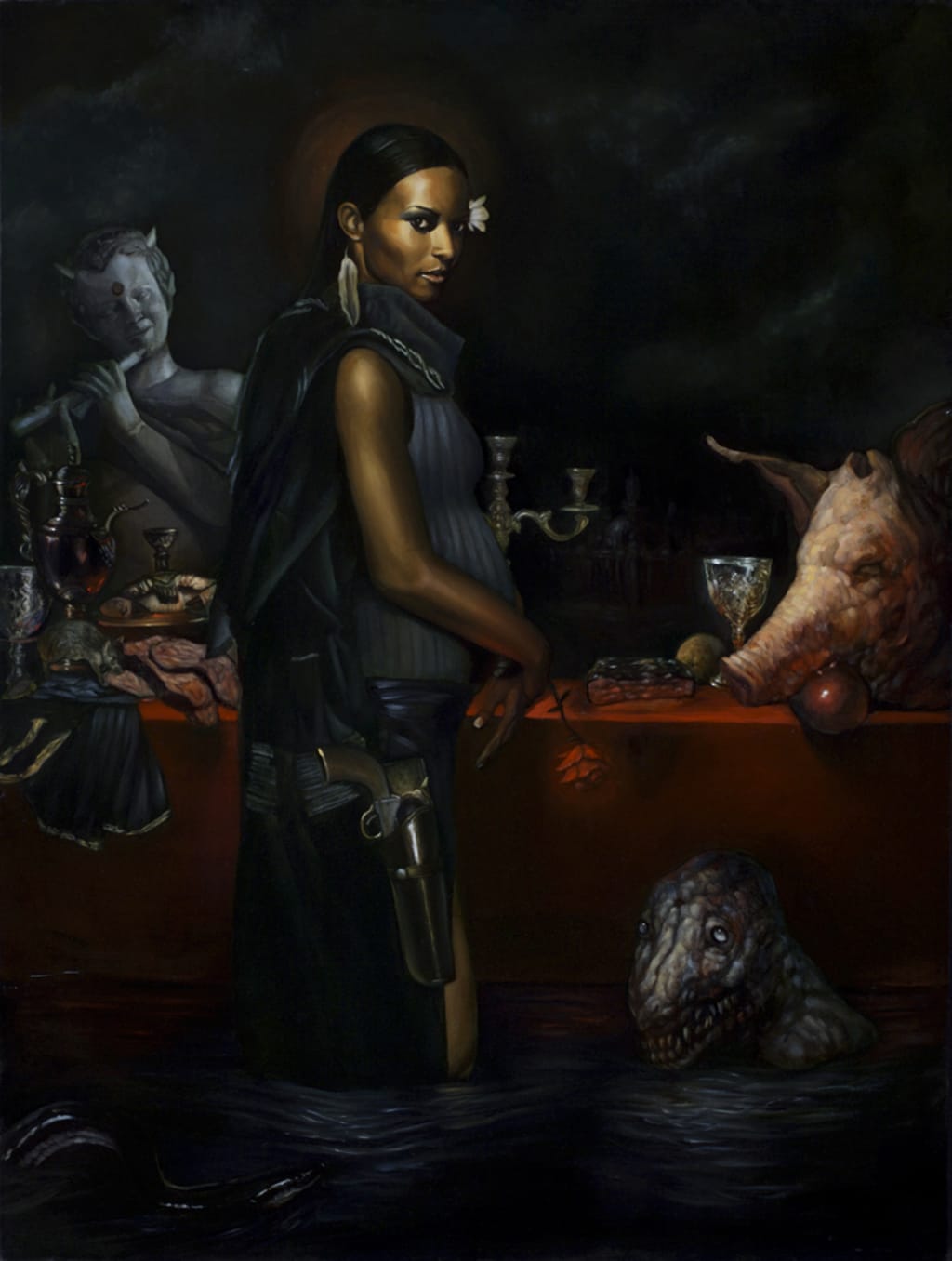The Possession of Susannah and Her Song
The Appropriation of Susannah Dean in Stephen King's sixth installment of the Dark Tower series

When I watched The Princess and the Frog for the first time a year or two ago, I remember thinking "how wonderful for Disney to finally make a beautiful black princess as the star of their film, thereby fulfilling their contractual obligation to indulge in one diverse character or story per year". Much more recently however, I was watching a video by YouTuber Amandabb, an actual black woman, who asked when Disney was actually going to come out with movie starring a black princess. Because though Tiana is indeed a young black princess, for the majority of the film, she has been transmogrified into a frog. So when will media finally embrace the black woman as she is? With this fresh on my mind, I began reading Stephen King's Song of Susannah, the sixth installment of his Dark Tower series. And I regret to say that, Disney isn't the only offender when it comes to the disservice of black women; Stephen King is getting in on it, too.
I began reading the Dark Tower series back when I was in my freshman year of high school. Susannah is introduced to the series in book two: The Drawing of the Three. From the first moment I met her, I befriended her. She's the only woman of the ka-tet in this series, so that appealed to me, and I will admit, I was taken by the fact that Mr. King was branching out with his characters into more diverse territory. She seemed powerful, she seemed capable; she seemed like a woman I could look up to. Though I could tell pretty early on that Stephen King was taking some liberties with her dissociative identity disorder, playing it up for added drama and feeding into the "evil alter" trope, on the whole, I was enamored with her. It wasn't until I arrived at this book however, that I stepped on the brakes and began to read more deeply, especially in the stanzas that centered on Susannah, and I began to make a disconcerting discovery regarding her characterization.
Song of Susannah finds Susannah herself having essentially been kidnapped by the demon Mia, who wants to birth Susannah's baby. They are trapped in a different "when" than either of them are used to; June 19, 1999, and they are about to go into labor. Needless to say, it is a stressful time for them. As I mentioned above, Susannah has consistently played host to at least one other alter during her journey to the Dark Tower with Roland, Eddie and Jake. However, her alter simply inhabits her body with her, sometimes making appearances if she has something to say. The difference with Mia is that there has been an actual hijacking that has taken place. Mia has come into Susannah's body and appropriated it for her own purposes, in doing so, shoved Susannah into the back of her own mind; "and somewhere...something clanged shut. It sounded like iron. We really are in the brig, [Susannah] told Detta," (King 163). Suddenly, Susannah, who's name is literally in the title of this novel, is no longer in charge of her own actions; Mia is. That doesn't sit right with me; seems a little too much like a frog transformation for our female black lead. But wait! There's actually a physical transformation that occurs to Susannah, too. Not only has her agency been taken away as she has been turned into a captive in her own mind, but she is physically becoming white. For background, Susannah was shoved in front of a train in her youth and her legs were cut off below the knees. Upon her and Mia's arrival into June 1999, she grows legs, but because Mia is in charge, and she is a white demon, the legs that appear are white. It does make sense with the story and the way Stephen King is writing Susannah's possession, as a gradual taking over of Susannah's body by Mia; but simultaneously, it is kind of icky that there are even physical changes occurring to Susannah take away from her blackness. And though at first, Susannah is only white from the knees down, Mia continues to exert her power over Susannah to the point that the whitening begins to spread; "something about this frightened Susannah terribly...If Mia had only replaced those parts of her legs that...had [been] lost to the subway train...she would have been white only from the knees or so down. But her thighs were white, too...What strange lycanthropy was this?" (King 309). She is not allowed to exist as a black woman, trying to navigate a time that she doesn't understand, which would be conflict enough in itself; she is forced to have a white clinger-on, who dominates her body, and controls her mind.
So why is this disconcerting for me? Since the days of exhibitions which featured black women as their defining attractions, white people have sought to dehumanize the black body in order to maintain the status as the oppressor. Perhaps this was never Mr. King's intention while writing this novel; as a fan of a number of his works, I would like to think this is the case. But as writers, we have a responsibility in understanding problematic character tropes, especially when it comes to minority characters, and then not writing our characters that way. Mia simply views Susannah's body as a vehicle to transport her baby; "Susannah had no idea which of her glands and organs were taking the biggest beating, but she knew they were hers. Not Mia's'" (King 460), which robs Susannah of a certain level of her humanity. This is where my main issue lies; by removing Susannah's control of her own body, she has been denied the basic human agency that is afforded to other characters in the novel. She can't make her own decisions; Mia makes them for her. She is another black character pushed into the roll of the servile accommodater, answering to Mia's beck-and-call instead of her own.
So Disney, if you're reading this, give us an actual black princess. And Stephen King, if you are reading this, give us a strong black woman who can be the center of her own story.
Quotes from:
King, Stephen. Song of Susannah. New York, Pocket Books, 2004.
Video referenced:
Amandabb. "we still don't have a black disney princess movie..." YouTube.com, Dec. 6, 2019, youtube.com/watch?v=UaT0d18nevc.
Further reading on black exhibitions:
Parkinson, Justin. The Significance of Sarah Baartman. BBC News Magazine, 7 Jan. 2016, https://www.bbc.com/news/magazine-35240987. Accessed 25 July 2020.
This article looks at the life of Sarah Baartman, a South African woman who was used in "freak shows" to show off her "exotic" features.
About the Creator
Adeleine Grubb
Hello!
My name is Adeleine Grubb and I am a 2020 graduate from the University of Iowa's writing program. I am working on building up my writing portfolio, and I am appreciative of any and all support that I receive. Thank you!






Comments
There are no comments for this story
Be the first to respond and start the conversation.